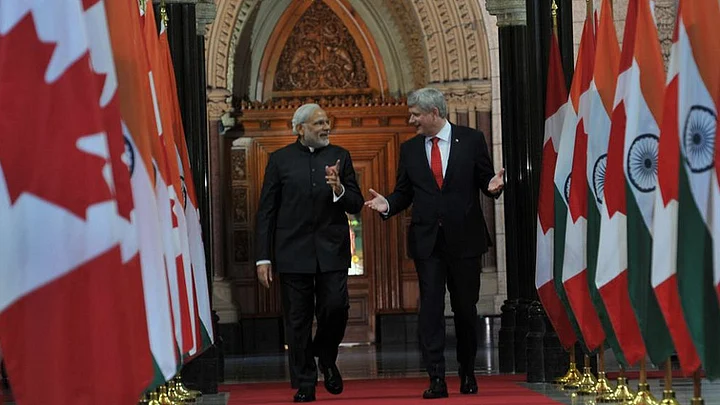Ottawa’s decision to supply uranium to India for five years announced on April 15 by Canadian Prime Minister Stephen Harper on the first day of the Modi visit to Canada augurs well for the bi-lateral relationship which has inherited a troubled past over the nuclear issue.
The agreement on procurement of uranium from Canada for our civilian nuclear power plants launches a new era of bilateral cooperation. Uranium should not be looked at on the basis of give and take. This is a matter of trust.
– Narendra Modi
While this agreement is significant in relation to India’s growing energy needs to sustain its economic growth and development efforts, the symbolism is as poignant.
Canada played a valuable role in the development of India’s nuclear evolution and the first reactor reactor CIRUS was supplied in 1954. However after the Indian nuclear explosion of 1974 (also referred to as the PNE – peaceful nuclear explosion ), the nuclear cooperation was suspended and the bi-lateral relationship withered.
While Ottawa and Delhi have made attempts over the last decade to infuse content into the relationship – it has remained stunted. Though the nuclear rapprochement with the USA and other major powers in late 2008 has accorded India an exceptional status in the global nuclear comity – the actual process of engaging in tangible nuclear cooperation is a bi-lateral matter.
Sensitivities over the nuclear issue run deep and it is a reiteration of the trust that is now reposed in India that allows countries like Canada to review their policies and renew nuclear commerce with Delhi. Thus the symbolism against the backdrop of CIRUS and 1974 is distinctive.
India and Canada are two large economies with GDPs in the US $ 2 trillion range but their bi-lateral trade is very modest and a little over $ 4 billion. Infusing long-term economic and trade content is critical and the supply of uranium for India’s civilian nuclear program will be beneficial to both democracies.
India’s energy requirements are growing and if the current GDP growth rate of 7.5 percent is to be sustained and improved upon – affordable and environmentally viable energy options are imperative.
In this regard, it is only the nuclear sector that allows for a scaling up if the Indian civil nuclear program proceeds as per plan. While the nuclear component of India’s composite energy basket is under 4 percent, it has the potential to be taken to a higher level provided the country has assured uranium fuel supplies. This is where the agreement with Canada is significant.
More than 60 percent of the world’s production of uranium is from a cluster of three nations - Kazakhstan, Canada and Australia. Among them, Cameco the Canadian corporation produces as much as 15 percent of the total global supply.
Thus, concluding an agreement with Cameco increases the bandwidth of uranium suppliers for India and this will be of considerable importance to Delhi as it reviews its composite energy options.
While the Fukushima experience must induce a note of caution as regards nuclear energy, the viability of nuclear energy as opposed to hydrocarbons in relation to global warming cannot be brushed aside. PM Modi observed in Ottawa, “the whole world is affected and worried about the issue of global warming and climate change.”
Canada with its commitment to democracy and diversity, vast natural resources and economic profile offers many areas for potential cooperation and the Modi visit will hopefully lay the foundation for realising this shared objective.
The fact that an Indian Prime Minister is visiting the land of the maple leaf after 40 years is in itself indicative of the past dormancy of the bi-lateral and the current political resolve that both nations have now brought to bear. The challenge now is to swiftly implement the various agreements that have been enthusiastically announced. One presumes that Canada also has a strategic interest in ensuring that its engagement with Asia is not cloistered in a China-centric manner.
(C. Uday Bhaskar is one India’s leading experts on Strategic Affairs. He is currently Director, Society for Policy Studies)
